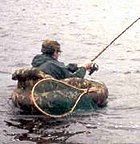Eel buck
Appearance

An eel buck or eel basket is a type of fish trap that was prevalent in the River Thames in England up to the 20th century. It was used particularly to catch eels, which were a staple part of the London diet.

Eel bucks were baskets made of willow wood, and were often strung together in a fishing weir. Construction of such weirs was outlawed under the terms of Magna Carta in 1215:
- All fish-weirs shall be removed from the Thames, the Medway, and throughout the whole of England, except on the sea coast.[1]
This was intended to keep the rivers navigable by boat,[2] however the practice continued unabated.
Several islands in the River Thames reflect the presence of bucks at those points; for example, Buck Ait and Handbuck Eyot.[3]
A surviving eel buck may be seen on the River Test at 51°7′48″N 1°29′5″W / 51.13000°N 1.48472°W.[4]
See also
[edit]References
[edit]- ^ The Text of Magna Carta, see paragraph 33.
- ^ Blair, John (25 October 2007). Waterways and Canal-Building in Medieval England. OUP Oxford. p. 53. ISBN 978-0-19-152715-9.
- ^ Fred. S. Thacker The Thames Highway: Volume II Locks and Weirs 1920 - republished 1968 David & Charles
- ^ The Fine Art of Trapping Eels, The Fishing Museum online, retrieved 19 May 2012


